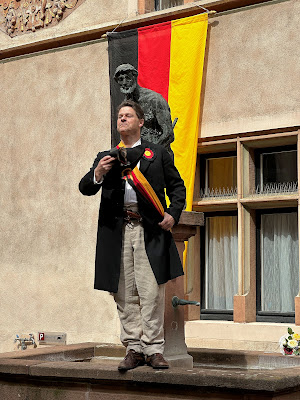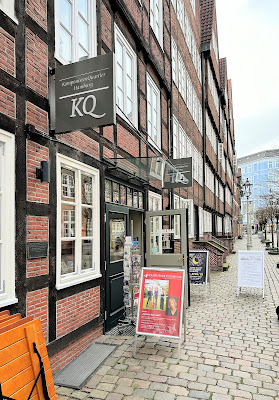Alban Berg composed his opera Wozzeck based on Georg Büchner's drama fragment of 1836 "Woyzeck." Woyzeck is considered a masterpiece of the German language and an essential work of naturalistic social drama.
At the center is a maltreated human being, the mentally ill soldier Franz Woyzeck, who is morally lectured by his HAUPTMANN (Captain), treated as an experimental subject by his DOCTOR, and made a cuckold by his beloved MARIE with a fancy Drum Major.
In Büchner's fragment, we find the sentence, "Our kind is unhappy in this and the other world. Nothing but work under the sun, even sweat in our sleep. We poor people... "
Red Baron saw Büchner's drama Woyzeck several times in his life and Berg's opera as a pupil at the Hamburg State Opera in 1953. At that time, I was impressed by a scene where the DOCTOR acts out his scientific ambition on his Guinea pig WOZZECK.
DOCTOR: Has he eaten his beans yet, Wozzeck? Nothing but beans, nothing but legumes! He's got to remember that! The following week we'll start on a lamb. There is a revolution in science. Oh! My theory! Oh, my glory! I will become immortal! Immortal! Immortal!
In the first scene of the drama, WOZZECK shaves the HAUPTMANN: Slowly, Wozzeck, slowly! One thing after the other. He makes me dizzy. What should I do with the ten minutes he finishes too early today?
Wozzeck, remember, he still has his beautiful thirty years to live! Thirty years: that's three hundred and sixty months, and only how many days, hours, minutes! What does He want to do with all that time? Divide it up, Wozzeck!
WOZZECK: Jawohl Herr Hauptmann (Aye, Captain)!
HAUPTMANN: Wozzeck, it's all right, it's all right! I know: He is a good man.
WOZZECK: Jawohl, Herr Hauptmann!
HAUPTMANN: Oh, he's stupid; he's foolish. Wozzeck, he is a good man, but ... He has no morals! Morals: that's when you're moral! Does he understand? It's a good word and alludes to MARIE's child: He has a child without the church's blessing...
Now it screams out from permanently agitated WOZZECK: We poor people! You see, Captain, money, money! Who has no money! Just once, someone gives birth to his own kind in a moral way! One also has his flesh and blood! Yes, if I were a gentleman with a hat, a watch, and eyeglasses and could speak nobly, I would want to be virtuous! There must be something beautiful about virtue, Captain. But I am a poor fellow! Our kind is unfortunate in this world and in the other! If we were to go to heaven, we would have to help thunder!
HAUPTMANN: It's all right, it's all right. I know: He is a good man, a good man. But he thinks too much. It wears him out. He always looks so riled up.
The discourse has attacked me. Now go, and does he not run like that! Walk slowly down the street, right in the middle, and again, walk slowly, nice and slow!
Büchner's stage direction is:
Woyzeck cuts sticks in the bushes, but in the Freiburg staging,
Wozzeck does not cut, but as soon as he enters the stage, he breaks off a
branch and begins to whittle. And he whittled during the whole
performance.
After observing the "whittling" Wozzeck for a while, a scene in Annette von Droste-Hülshoff's novella Die Judenbuche came to my mind.
Friedrich Mergel, accused of having slain a Jew under a beech tree*, flees into foreign lands. As an old man, he returns unrecognized to his home village, where he earns a living as a carver of wooden spoons. One day he goes to the Breder Wood near the village and does not return.
* The villagers called the tree The Jew's Beech (Die Judenbuche).
A child had seen him sitting on the edge of the Breder Wood, whittling away at a spoon. "But he cut it all asunder," said the little girl.
Finally, Friedrich is found. He had hanged himself at the "Judenbuche," the place of his crime.
Of course, we read Droste von Hülshoff's masterpiece in school, and of course, we had to write an essay about it. One of my classmates, a master of the German language, wrote the best essay, as usual. The girl's statement, "But he cut it all asunder," culminated in my classmate's final sentence, "Friedrich whittled away at his life, but he cut it all asunder." The teacher and we all were impressed.
Had the Freiburg Wozzeck performance director read Die Judenbuche for Wozzeck also cut his life asunder.
Back to the opera performance. In the actors' costumes, the director had gone wild in alienation. Thus the captain appeared in women's clothes and sang and acted accordingly, overdressed. Next to the leading actor, he later received the most applause.
The stage with the orchestra rotated in the background of the actors acting toward the audience. A notable element was a balloon that hovered above the stage and changed color and shape depending on the scene being played.

|
|
DOCTOR,WOZZECK, and HAUPTMANN: - Hey, Wozzeck? But he has a good wife, doesn't he? - What are you trying to say, Doctor, and you, Captain? (©Stadttheater) |
HAUPTMANN: Hey, Wozzeck? But he has a good wife, doesn't he?
WOZZECK: What are you trying to say, Doctor, and you, Captain?!
HAUPTMANN: What a face that guy makes! Well! A hair, if not precisely in the soup, but if he hurries and runs around the corner, maybe he can still find one on a pair of lips! A hair, namely on a pair of lips! Oh, I felt the love once, too! - But, guy, he's white as a sheet!
WOZZECK: Captain, I'm a poor devil! I have nothing else in this world! Herr Hauptmann, if you're joking...
HAUPTMANN: I mean well with him because he is a good man ...
Wozzeck is tossed back and forth by extreme sensory input; his delusions lead him inexorably toward his personal apocalypse.
WOZZECK meets MARIE and now is sure: You with him!
MARIE: And even if!
WOZZECK wants to hit her: Bitch!
MARIE: Don't touch me! I'd rather have a knife in my body than a hand on me. My father didn't dare when I was ten years old ...
WOZZECK: "Better a knife"... Man is an abyss; it makes you dizzy when you look down. I'm dizzy ...
WOZZECK: You have gone far, Marie. You shall no longer run your feet sore. It's quiet here. And so dark.
MARIE: How the moon rises red!
WOZZECK drawing his knife: Like a bloody iron!
MARIE: Why are you trembling? What do you want?
WOZZECK grabs her and plunges the knife into her throat: Not me, Marie! And no one else, either!
MARIE dies: Help!
WOZZECK: Dead!
Later Wozzeck returns to the place of his crime, looking for his left-behind knife.
WOZZECK: But the moon betrays me; the moon is bloody.
From afar, the Hauptmann and the Doctor hear the sounds of Wozzeck's fall: As if a man were dying.
The maltreated human being sinks into the lake.
Franz Wozzeck drowned himself, and Friedrich Mergel hung himself.

|
| Standing ovations: Drum Major, Marie, and Wozzeck |

|
| Applause well deserved |
*







































































